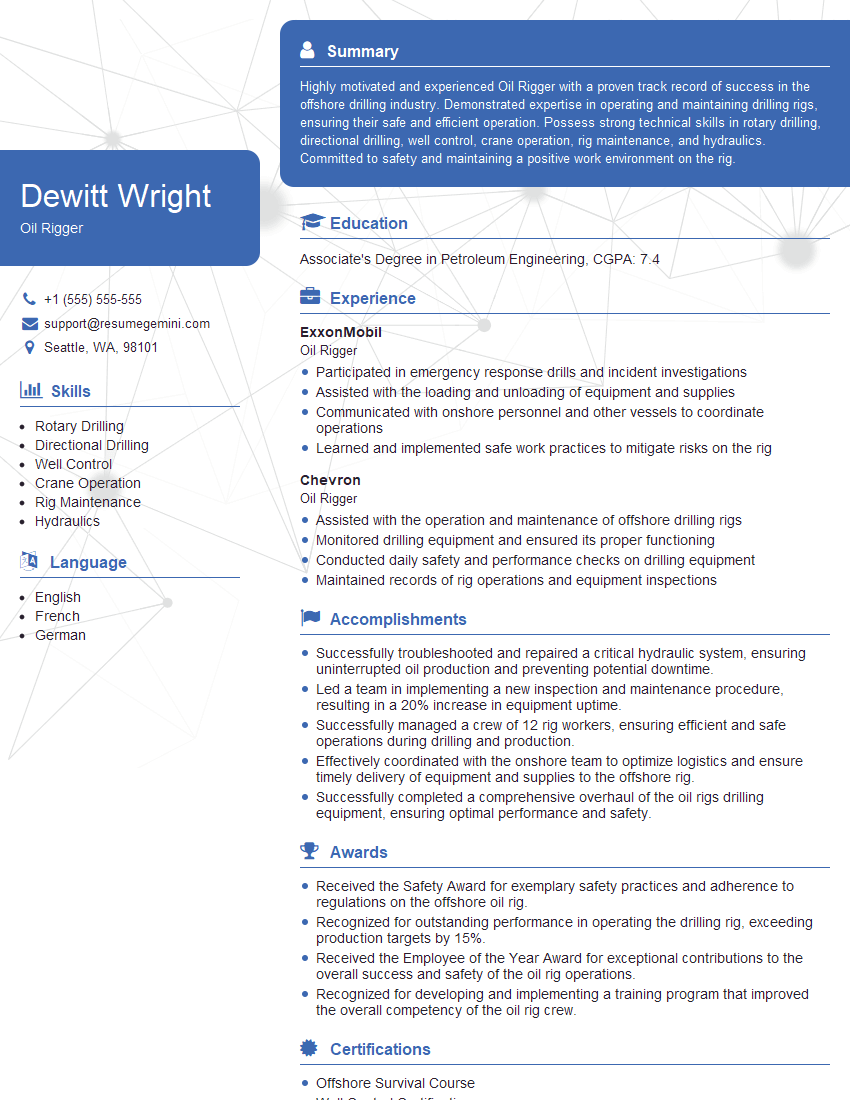Are you a seasoned Oil Rigger seeking a new career path? Discover our professionally built Oil Rigger Resume Template. This time-saving tool provides a solid foundation for your job search. Simply click “Edit Resume” to customize it with your unique experiences and achievements. Customize fonts and colors to match your personal style and increase your chances of landing your dream job. Explore more Resume Templates for additional options.

Dewitt Wright
Oil Rigger
Summary
Highly motivated and experienced Oil Rigger with a proven track record of success in the offshore drilling industry. Demonstrated expertise in operating and maintaining drilling rigs, ensuring their safe and efficient operation. Possess strong technical skills in rotary drilling, directional drilling, well control, crane operation, rig maintenance, and hydraulics. Committed to safety and maintaining a positive work environment on the rig.
Education
Associate’s Degree in Petroleum Engineering
March 2018
Skills
- Rotary Drilling
- Directional Drilling
- Well Control
- Crane Operation
- Rig Maintenance
- Hydraulics
Work Experience
Oil Rigger
- Participated in emergency response drills and incident investigations
- Assisted with the loading and unloading of equipment and supplies
- Communicated with onshore personnel and other vessels to coordinate operations
- Learned and implemented safe work practices to mitigate risks on the rig
Oil Rigger
- Assisted with the operation and maintenance of offshore drilling rigs
- Monitored drilling equipment and ensured its proper functioning
- Conducted daily safety and performance checks on drilling equipment
- Maintained records of rig operations and equipment inspections
Accomplishments
- Successfully troubleshooted and repaired a critical hydraulic system, ensuring uninterrupted oil production and preventing potential downtime.
- Led a team in implementing a new inspection and maintenance procedure, resulting in a 20% increase in equipment uptime.
- Successfully managed a crew of 12 rig workers, ensuring efficient and safe operations during drilling and production.
- Effectively coordinated with the onshore team to optimize logistics and ensure timely delivery of equipment and supplies to the offshore rig.
- Successfully completed a comprehensive overhaul of the oil rigs drilling equipment, ensuring optimal performance and safety.
Awards
- Received the Safety Award for exemplary safety practices and adherence to regulations on the offshore oil rig.
- Recognized for outstanding performance in operating the drilling rig, exceeding production targets by 15%.
- Received the Employee of the Year Award for exceptional contributions to the overall success and safety of the oil rig operations.
- Recognized for developing and implementing a training program that improved the overall competency of the oil rig crew.
Certificates
- Offshore Survival Course
- Well Control Certification
- Crane Operator Certification
- HSE Management Certification
Career Expert Tips:
- Select the ideal resume template to showcase your professional experience effectively.
- Master the art of resume writing to highlight your unique qualifications and achievements.
- Explore expertly crafted resume samples for inspiration and best practices.
- Build your best resume for free this new year with ResumeGemini. Enjoy exclusive discounts on ATS optimized resume templates.
How To Write Resume For Oil Rigger
- Highlight your technical skills and experience in rotary drilling, directional drilling, well control, crane operation, rig maintenance, and hydraulics.
- Showcase your commitment to safety by emphasizing your participation in emergency response drills and incident investigations.
- Quantify your accomplishments whenever possible, providing specific examples of how you contributed to the success of drilling operations.
- Use action verbs and strong industry-specific keywords throughout your resume.
- Proofread your resume carefully for any errors before submitting it.
Essential Experience Highlights for a Strong Oil Rigger Resume
- Assisted with the operation and maintenance of offshore drilling rigs, monitoring drilling equipment and ensuring its proper functioning.
- Conducted daily safety and performance checks on drilling equipment, maintaining records of rig operations and equipment inspections.
- Participated in emergency response drills and incident investigations.
- Assisted with the loading and unloading of equipment and supplies.
- Communicated with onshore personnel and other vessels to coordinate operations.
- Learned and implemented safe work practices to mitigate risks on the rig.
- Collaborated with other rig crew members as part of a team to achieve operational goals.
Frequently Asked Questions (FAQ’s) For Oil Rigger
What are the primary responsibilities of an Oil Rigger?
Oil Riggers are responsible for assisting with the operation and maintenance of offshore drilling rigs, conducting safety and performance checks, participating in emergency response drills, assisting with the loading and unloading of equipment and supplies, and communicating with onshore personnel and other vessels.
What qualifications are typically required to become an Oil Rigger?
Qualifications typically required to become an Oil Rigger include a high school diploma or equivalent, relevant work experience, and a valid commercial driver’s license. Some employers may also require additional certifications or training, such as a certificate in offshore drilling operations.
What is the work environment of an Oil Rigger like?
Oil Riggers work in a challenging and demanding environment offshore, often in remote locations. They must be able to withstand long hours, physical exertion, and potential hazards, including working with heavy machinery, exposure to extreme weather conditions, and potential risks associated with working in confined spaces.
What are the career advancement opportunities for an Oil Rigger?
Career advancement opportunities for Oil Riggers include promotions to higher-level positions on the rig, such as Driller, Toolpusher, or Offshore Installation Manager. With additional experience and training, Oil Riggers may also pursue roles in other areas of the oil and gas industry, such as production operations or engineering.
What safety measures are in place for Oil Riggers?
Rigorous safety measures are in place for Oil Riggers, including comprehensive training programs, regular safety inspections, and emergency response protocols. Oil Riggers are required to wear appropriate safety gear, such as hard hats, safety glasses, and gloves, and must adhere to strict safety guidelines while working offshore.